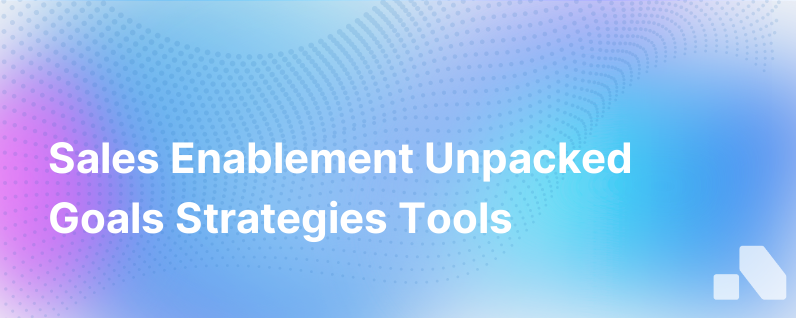
Sales enablement has emerged as a crucial methodology in synchronizing sales efforts toward liaising streamlined customer experiences and augmenting revenue generation. While historically its definition may have splintered across industry lines, one cogent definition encapsulates it as the iterative process of providing an organization’s sales team with the resources they need to close more deals. These resources typically include content, tools, knowledge, and information to sell products or services effectively.
The Goals of Sales Enablement
The essence of sales enablement lies within its mercurial goals – designed to adapt and align with an organization's overarching business objectives. Primarily, sales enablement aims to:
- Enhance Sales Efficiency and Productivity: Empowering sales representatives with tools and resources to reduce time-consuming activities that detract from active selling.
- Improve Sales Effectiveness: Sharpening the sales team’s approach to engaging with prospects and tailoring conversations to meet customer needs more precisely.
- Sales-Marketing Alignment: Syncing cross-departmental efforts to ensure collaboration and consistency across all customer touchpoints.
- Scale Best Practices: Using data-driven insights to identify and replicate successful sales strategies and behaviors across the team.
- Accelerate the Sales Cycle: Streamlining the path from lead to customer by removing friction and obstacles that slow down the sales process.
Crafting a Sales Enablement Strategy
To harvest the virtues of sales enablement, an actionable strategy is required—a template to navigate its manifold aspects. A robust sales enablement strategy is predicated on several critical components:
1. Clearly Define Objectives and KPIs: Your strategy should anchor itself in specific, measurable goals, such as increasing win rates, shortening the sales cycle, or boosting the average deal size.
2. Align Content and Training: A seamless blend of relevant content coupled with steady, insightful training ensures your sales team is both informed and qualified to apply what they learn in the field.
3. Implement Coaching and Development: Beyond training, continuous coaching helps reps to finesse their skills, adapt to market changes, and improve over time.
4. Enablement Technology Stack: Invest in tools tailored to optimize sales processes like CRM software, sales intelligence platforms, content management systems, and coaching tools. These not only yield efficiency but can also provide actionable insights for continuous improvement.
5. Analytics and Performance Tracking: Monitoring metrics and KPIs is pivotal; this warrants recalibration of strategies and tactics in alignment with real-time data.
The Arsenal: Tools for Sales Enablement
The arsenal of sales enablement is broad and kaleidoscopic, brimming with tools designed to not only streamline sales processes but also to enhance the capacity of sales teams. Here is a tableau of some quintessential tools:
-
CRM Platforms: The cornerstone of modern sales enablement tools—a robust Customer Relationship Management (CRM) system such as Salesforce or HubSpot serves as the sales team's central hub for tracking interactions, managing relationships, and gaining insights from customer data.
-
Sales Intelligence Tools: Platforms like LinkedIn Sales Navigator or ZoomInfo are indispensable in this era. They proffer deep insights into prospective clienteles and facilitate the personalized engagement essential for today's hyper-competitive markets.
-
Content Management Systems: Tools like Seismic and Highspot not only organize sales content but also ensure that the right material is accessible at the right stage in the buyer's journey.
-
Learning Management Systems (LMS): Investing in platforms like Showpad or Bridge enables continuous learning and upskilling, which is essential in keeping sales teams at the apex of competitiveness.
-
Engagement Tools: Platforms such as Outreach and SalesLoft mechanize and personalize customer engagement through email sequences, social media, and more—enabling more touches with less manual effort.
-
Analytics and Performance Tools: These solutions offer critical insights into how sales content and practices perform, allowing teams to optimize their sales tactics continuously.
The Symbiosis of Sales and Content
An often underrated yet imperative facet of sales enablement is content. Not just any content–but strategic, targeted content that addresses the buyer’s journey. The sales and marketing departments must amalgamate their acumen in creating sales content that resonates, engages, and convinces.
All forms of sales content, from case studies, white papers, product sheets, to blogs and infographics, must be easily accessible and customizable by sales reps to address a prospect's unique challenges and opportunities. This ensures that sales reps are not merely armed with generic pitches, but rather with a quiver of tailored arrows to hit the bullseye of each customer’s needs.
Conclusion and Aomni
At its core, sales enablement aims to build a bridge between the selling potential of your team and the realization of your business's revenue targets. It is an ongoing, responsive process shaped by the immediate dynamism of the sales environment and the strategic vision of the organization.
While many of the strategies and tools mentioned above can have a profound impact on the efficacy of a sales team, their integration and maintenance often pose a challenge. This is where an AI-driven platform like Aomni can make a pivotal difference — by automating account research, providing competitive insights, and customizing sales content, Aomni streamlines the sales enablement process in a way that requires zero effort from the sales teams themselves. Such tools are not just enablers; they are the catalysts for transforming potential into performance, allowing startups and seasoned enterprises alike to scale their sales efforts with unprecedented efficiency.